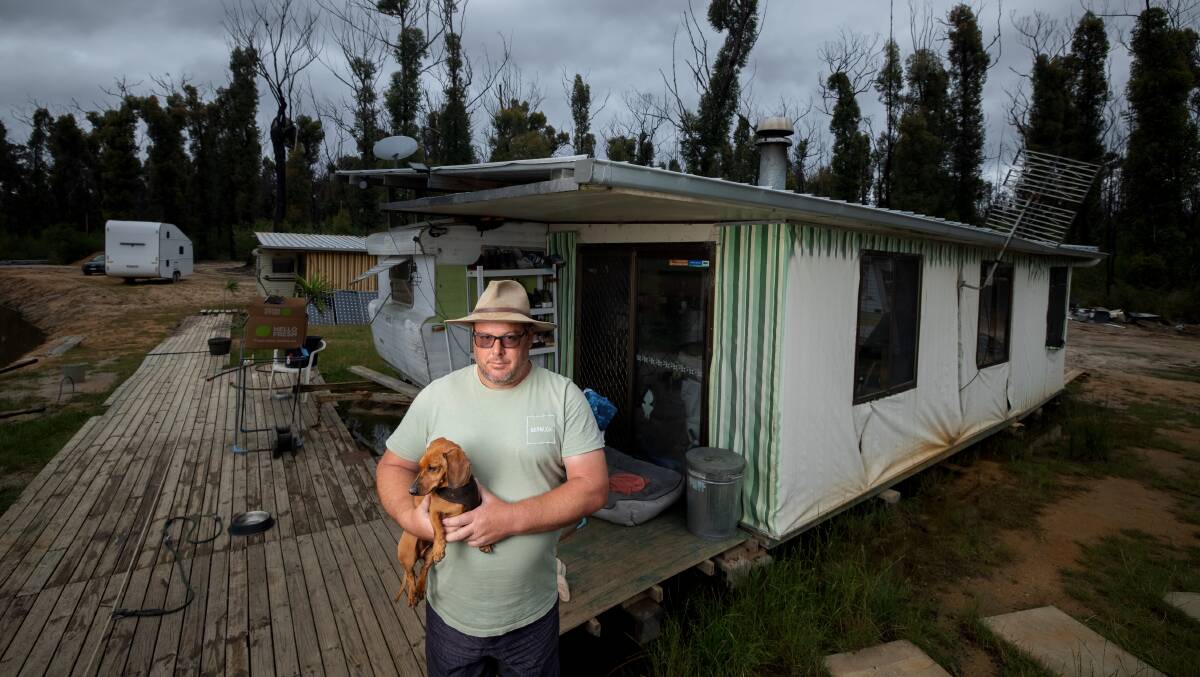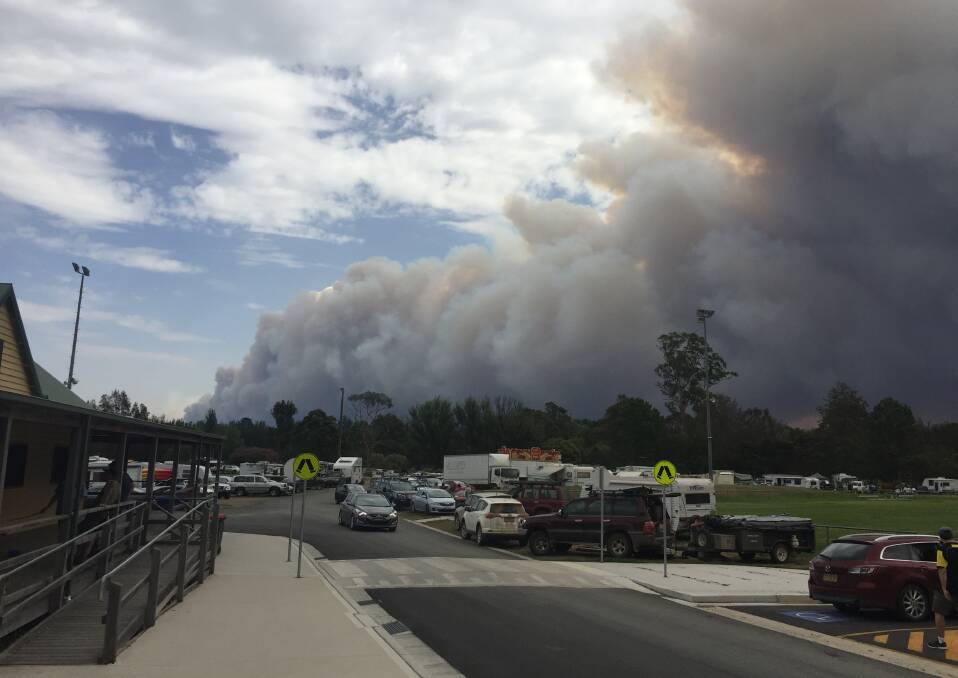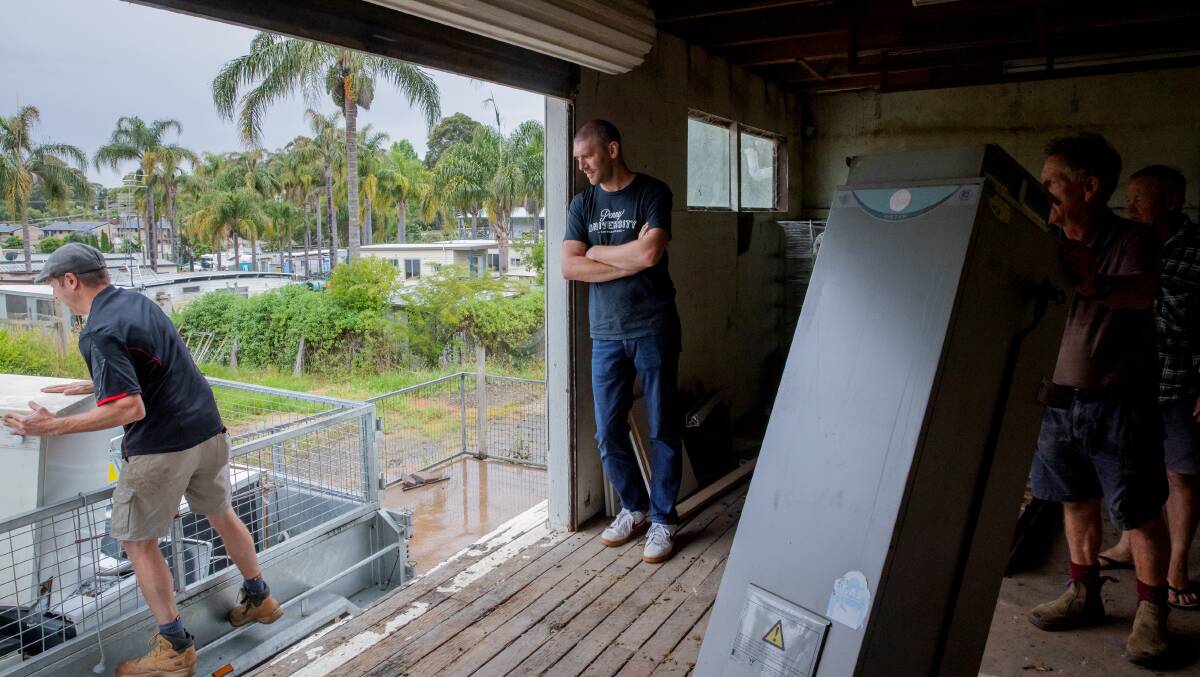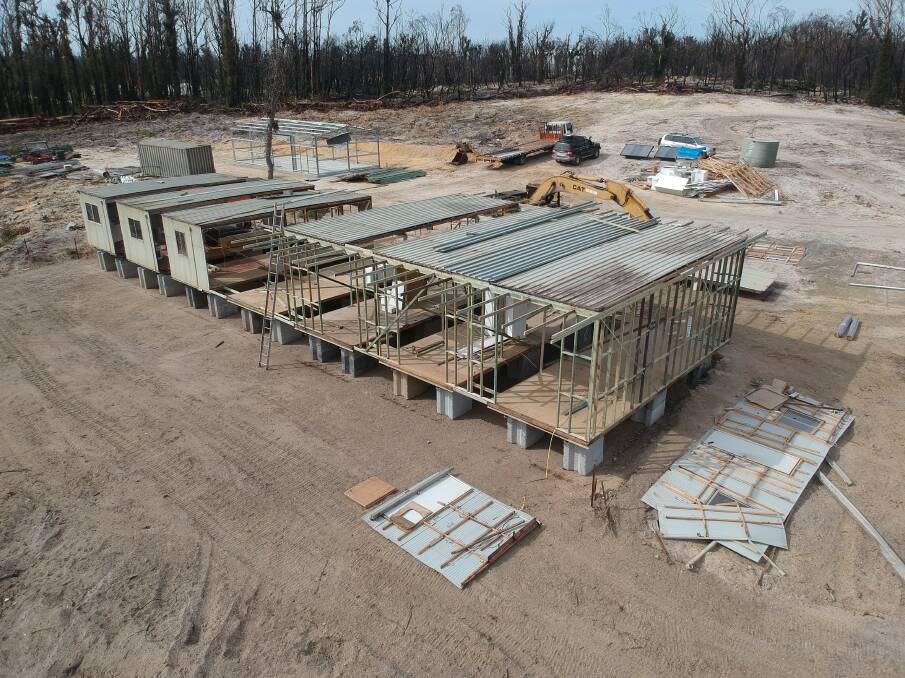
Two years on from the Black Summer Bushfires, Shane Tegel and his family are still living in caravans on their Jeremadra property, 10 kilometres south of Batemans Bay.
Subscribe now for unlimited access.
or signup to continue reading
The family of six had just moved into their new home when fire ripped through the South Coast, destroying the house they were still putting finishing touches to.
At 4am on New Year's Eve Mr Tegel received word from his neighbour the fire was closing in.
Stepping outside into the smoke, Mr Tegel said the hot night air was enough warning it was time to move quickly.
"I was still in the process of building the new house so we weren't prepared," he said.
"We had no chance of fighting it, so our plan was to leave."
The family threw what it could into a caravan and took off for the Moruya showgrounds at about 6.30am.
At 8.30am the neighbour texted that the house was gone.
For the next 12 days the family joined the hundreds of people needing food, shelter and support at what had become a ramshackle refuge for evacuees waiting to hear what had happened to their homes.
"It was chaos, absolute chaos. At the start there wasn't even any food for everyone because the trucks weren't allowed in," he said.
"We sort of knew we'd lost everything, but what did that mean?"
There was 501 homes destroyed in the Eurobodalla Shire that summer and 467 homes in the nearby Bega Valley Shire. Further north, 285 families in Shoalhaven completely lost their homes.
The cost to the local economies was estimated at $150.3 million in Eurobodalla, $218.9 million in Bega and $345 million in Shoalhaven.
Robert Salway, his son Patrick Salway, Richard Steele, Colin Burns, John Smith and Ross Rixon all died after being caught in the Badja Forest Fire on New Year's Eve.

Mr Tegel said even as news trickled in of homes being spared, the trauma was shared throughout the showgrounds during those initial days and had continued in the community for the weeks and months since.
"We had no power, no phones, no TV, no radio, everything was cut off, there was no communication, so no awareness of what was happening on the outside," he said.
"People in Sydney and Canberra knew more about what was going on down here than we did.
"We were just waiting here isolated - that affected absolutely everyone."
Mathew Hatcher had not long bought his coffee business to the region when the bushfires started closing in.
While his home and business were spared, Mr Hatcher said memories of that period and two years of driving a recovery effort for those worse off had taken its toll.
"It's very hard to talk about it still," Mr Hatcher said.
"It was a very traumatic experience for every single person down here."
In December 2021, Mr Hatcher was coordinating volunteers to dump unusable donated goods from a warehouse in Batemans Bay.
One of the last operating relief centres since COVID forced the closure of council-operated facilities in Batemans Bay and Narooma in March, 2020.

In an unpredictable blow for bushfire survivors, community outreach was also suspended in early 2020 in response to the nationwide lockdown and COVID cases on the coast.
Despite the cessation of some services, both Eurobodalla and Bega councils have acknowledged to The Canberra Times that many residents who lost their homes in the bushfires were still living in temporary accommodation while they worked through recovery.
Mr Hatcher said while relief had become harder to come by, it didn't mean the job was done.
"People do want to move on from it but, you know, we're here on the ground and you can't just move on," he said.
When the bushfires hit in 2019, Mr Hatcher had planned to use his business to provide free coffee to firefighters.
Instead, he ended up finding homes for the truckloads of goods sent from well-meaning donors around the country.
On his way back from making coffees at the Moruya fire station he came across a Sydney truck driver about to dump 40 pallets of goods because he didn't know where to take them.
Another two trucks were on the way with no clear destination for the food, clothes, water and furniture they were transporting from the city.
At home that afternoon he was told his wife had given them the green light to unload.
"About an hour later, I got a phone call from another truck driver. They said, 'Listen, there's hundreds of trucks coming from all over the country and they're loaded up with goods to bring here'," Mr Hatcher said.
Over the next few days and weeks the coordination effort went from a handful of people forced to act to multiple volunteers working out of several warehouses to feed and clothe hundreds of people.

Mr Hatcher said without ongoing funding or support the service had to end in December.
He said the concern now was the long-term impact the bushfires would have on the coastal communities, particularly those with a high proportion of people doing it tough before the bushfires.
The median income in Eurobodalla of $37,455 is lower than the NSW median of $50,153. The proportion of people receiving age pensions, carers' allowance, disability support and rent assistance was also higher than the national average.
While the lion's share of the $2.5 billion in federal bushfire support had now been allocated, Mr Hatcher said there was still a huge need for relief, particularly in the form of mental health support.
"I see an uptick in families breaking up, an increase in domestic violence and we've seen a big uptake in suicide," he said.
Mr Hatcher, who has just run for local council, said it was important the long-term effects and how things like increased drug use would affect coastal towns was not forgotten now the bushfires weren't making headlines.
"I've got to sink my teeth into this and make sure people don't forget about these communities, otherwise we won't have a community," he said.

At the family property in Jeremadra, Mr Tegel was "three years into building his second house" in December.
After fires, flooding, mouse plagues and the pandemic, the family now hoped to move in during March or April 2022.
Mr Tegel said with no insurance for the home he'd all but completed when the bushfires came through two years ago, they'd gone into debt and relied on donations to get through.
READ MORE:
Looking on, the family just want out of the leaky, crowded caravans they've called home for almost four years.
"I thought these vans would be great because family could come and stay at the house and how cool would they be?" he said.
"Now we can't wait to never see them again."
Our journalists work hard to provide local, up-to-date news to the community. This is how you can continue to access our trusted content:
- Bookmark canberratimes.com.au
- Download our app
- Make sure you are signed up for our breaking and regular headlines newsletters
- Follow us on Twitter
- Follow us on Instagram


